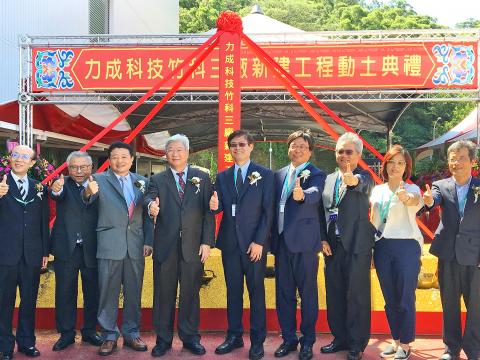Memorychip tester and packager Powertech Technology Inc (力成科技) yesterday said it plans to invest NT$50 billion (US$1.63 billion) in the next five years to build an advanced fab for next-generation packaging technology, catering to growing demand for smaller and energy-saving chips for artificial intelligence, Internet of Things and autonomous vehicle applications.
Fab 3 in Hsinchu Science Park is to be the world’s first fab that commercially uses fan-out panel-level packaging (FOPLP) technology when it starts operations in the second half of 2020, Powertech said.
The announcement comes after Powertech’s major breakthroughs in commercializing the technology since it began secretly investing in it two years ago.

Photo: CNA
“It is becoming increasingly difficult and expensive to shrink transistor [geometry] even smaller ... to keep Moore’s law going,” Powertech chairman D.K. Tsai (蔡篤恭) told a media briefing, referring to an observation that processing power doubles every two years, while costs reduce by half.
“We believe FOPLP technology will be one of the solutions as the technology helps integrate heterogeneous ICs [integrated circuits] in a [smaller] system in an economical way,” Tsai added.
FOPLP technology is more cost-effective, compared with rival fan-out wafer-level packaging, as rectangular panels can be cut into more chips than 12-inch round wafers, Tsai said.
Taiwan Semiconductor Manufacturing Co (TSMC, 台積電) uses fan-out wafer-level packaging.
Asked whether Powertech would directly compete with the world’s biggest contract chipmaker, Powertech chief technology officer David Fang (方力志) said that the company’s targeted customers “might be different from TSMC’s.”
ASE Technology Holding Co (日月光投資控股), the world’s biggest chip tester and packager, has said it is also developing FOPLP technology, but has not provided details.
Fab 3 is to create 3,000 jobs, the company said, adding that it is to have an installed capacity of 50,000 sheets a month, or 150,000 12-inch wafers.
“We have to invest in advanced technologies to support our growth and to survive,” Tsai said.
Fab 3 would satisfy burgeoning demand for new chip packaging technologies in the next decade, Powertech said.
The company plans to use its cash flow to finance construction of the fab, as it had NT$19.88 billion of cash on hand as of June 30.
Providing the company’s business outlook for next quarter, Powertech president Hung Chia-yu said that the fourth quarter would differ from previous years.
“The fourth quarter is usually the strongest season for Powertech, but this year, it will be very similar to the third quarter [in revenue],” Hung said.
Hung attributed the stagnation to customers’ inventory corrections.
Powertech in July and last month saw revenue jump 14.6 percent to NT$12.31 billion, compared with NT$10.75 billion in the same period last year, Taiwan Stock Exchange filings showed.

CHIP WAR: Tariffs on Taiwanese chips would prompt companies to move their factories, but not necessarily to the US, unleashing a ‘global cross-sector tariff war’ US President Donald Trump would “shoot himself in the foot” if he follows through on his recent pledge to impose higher tariffs on Taiwanese and other foreign semiconductors entering the US, analysts said. Trump’s plans to raise tariffs on chips manufactured in Taiwan to as high as 100 percent would backfire, macroeconomist Henry Wu (吳嘉隆) said. He would “shoot himself in the foot,” Wu said on Saturday, as such economic measures would lead Taiwanese chip suppliers to pass on additional costs to their US clients and consumers, and ultimately cause another wave of inflation. Trump has claimed that Taiwan took up to

A start-up in Mexico is trying to help get a handle on one coastal city’s plastic waste problem by converting it into gasoline, diesel and other fuels. With less than 10 percent of the world’s plastics being recycled, Petgas’ idea is that rather than letting discarded plastic become waste, it can become productive again as fuel. Petgas developed a machine in the port city of Boca del Rio that uses pyrolysis, a thermodynamic process that heats plastics in the absence of oxygen, breaking it down to produce gasoline, diesel, kerosene, paraffin and coke. Petgas chief technology officer Carlos Parraguirre Diaz said that in

Japan intends to closely monitor the impact on its currency of US President Donald Trump’s new tariffs and is worried about the international fallout from the trade imposts, Japanese Minister of Finance Katsunobu Kato said. “We need to carefully see how the exchange rate and other factors will be affected and what form US monetary policy will take in the future,” Kato said yesterday in an interview with Fuji Television. Japan is very concerned about how the tariffs might impact the global economy, he added. Kato spoke as nations and firms brace for potential repercussions after Trump unleashed the first salvo of

SUPPORT: The government said it would help firms deal with supply disruptions, after Trump signed orders imposing tariffs of 25 percent on imports from Canada and Mexico The government pledged to help companies with operations in Mexico, such as iPhone assembler Hon Hai Precision Industry Co (鴻海精密), also known as Foxconn Technology Group (富士康科技集團), shift production lines and investment if needed to deal with higher US tariffs. The Ministry of Economic Affairs yesterday announced measures to help local firms cope with the US tariff increases on Canada, Mexico, China and other potential areas. The ministry said that it would establish an investment and trade service center in the US to help Taiwanese firms assess the investment environment in different US states, plan supply chain relocation strategies and